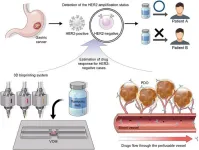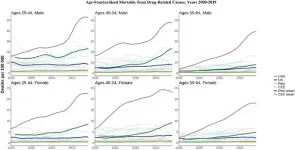(Press-News.org) Gastric cancer ranks among the most widespread diseases in Asian populations, with South Koreans experiencing the third-highest incidence globally in 2020, as reported by the International Agency for Research on Cancer. Recently, a collaborative research effort between Pohang University of Science and Technology (POSTECH) and Yonsei University achieved advancement in the realm of precision personalized medicine for gastric cancer. By using 3D bioprinting to accurately replicate the biological environment surrounding gastric cancer cells, the researchers have achieved a significant feat—predicting a patient's response to anticancer drugs during the preclinical stage. This marks a significant milestone in the exploration of precision personalized medicine for gastric cancer.
A team of researchers including Professor Jinah Jang from the Department of Mechanical Engineering, the Department of Convergence IT Engineering, the Department of Life Sciences, and the School of Convergence Science and Technology), Professor Dong-Woo Cho from the Department of Mechanical Engineering, Ph.D. candidate Jisoo Kim from the School of Interdisciplinary Bioscience & Bioengineering at the POSTECH, Professor Jae-Ho Cheong from the Department of Surgery and Dr. Jungmin Kim from the BioMedical Science Institute at Yonsei University collaboratively developed a vascularized gastric cancer model for personalized drug therapy by using patient-derived organoids (PDOs). The results of their research were published in an international journal Advanced Functional Materials.
Clinical trials, aimed at assessing the efficacy of new drugs or treatments, are typically conducted on humans. The ability to predict patient responses during the preclinical phase is crucial for selecting suitable candidates for these trials. This not only helps in minimizing unexpected side effects but also enhances the overall success rates. Unfortunately, existing technologies face limitations in accurately replicating the pathology of gastric cancer and the intricate environment surrounding the tumor in vitro.
To address this challenge, the research team used organoids obtained from gastric cancer patients along with 3D bioprinting technology. This approach led to the development of a vascularized organoid model (VOM) that faithfully reproduces the actual vasculature and environment of gastric cancer. The incorporation of a stomach-derived decellularized extracellular matrix (st-dECM), rich in stomach-specific matrix proteins such as collagen, contributed to a high cell viability rate exceeding 90%. Furthermore, the model demonstrated a high level of similarity to actual gastric cancer conditions.
Based on these findings, the team generated patient-specific vascularized organoid models (VOMs) for use in drug trials. The outcomes revealed distinct responses to the same drug among different patient models, aligning with real-world clinical trial results. The created VOMs, faithfully replicating the microscopic vasculature and biological conditions of gastric cancer, enabled the team to predict patient responses during the preclinical stage.
Furthermore, the VOM accurately mimicked the clinical response to the vascular endothelial growth factor receptor (VEGFR2). The research highlighted the limitation of the currently employed human epithelial cell proliferation factor receptor (HER2) as the sole target in clinics, underscoring its ineffectiveness for patients unresponsive to this target. This research creates new possibilities for a broader spectrum of therapies.
Professor Jinah Jang who led the research stated, “We have developed a promising platform for personalized cancer treatment.” She added, “This platform has potential applications in other types of cancer where drugs act through the blood vessels." Professor Jae-Ho Cheong from Yonsei University remarked, "The advanced biomodel platform is crucial in simulating diverse clinical trials at the laboratory level. It not only facilitates the study of cancer mechanisms but also enables the advance assessment of the effectiveness of anticancer drugs, offering a new paradigm for the implementation of precision medicine in cancer."
This research was supported by Korean Fund for Regenerative Medicine funded by Ministry of Science and ICT, and Ministry of Health and Welfare, the Korea Institute for Advancement of Technology (KIAT) and the Ministry of Trade, Industry & Energy(MOTIE) of the Republic of Korea, and National Cancer Center. This study was partly supported by the National Research Foundation of South Korea (NRF) grant funded by the Ministry of Science and ICT and the Korean government (MSIP), and Basic Science Research Program through the National Research Foundation of Korea(NRF) funded by the Ministry of Education.
END
Revolutionizing gastric cancer treatment through personalized 3D bioprinting
2024-03-21
ELSE PRESS RELEASES FROM THIS DATE:
How neural inhibition could reduce alcohol use
2024-03-21
LA JOLLA, CA—Neuroscientists at Scripps Research have found that inhibiting neurons involved in the body’s stress response may reduce alcohol consumption in people who have both post-traumatic stress disorder (PTSD) and alcohol use disorder (AUD)—even if they still experience trauma-related anxiety.
The findings were published March 21 in Molecular Psychiatry. These discoveries are helping untangle the complex role that stress and trauma play in neurological disorders like PTSD and AUD, while also informing the development of new treatment options for people who experience both these conditions simultaneously.
“Traumatic ...
The Lancet: Dramatic declines in global fertility rates set to transform global population patterns by 2100
2024-03-21
Embargoed access to the paper and contact details for authors are available in Notes to Editors at the end of the release.
By 2050, over three-quarters (155 of 204) of countries will not have high enough fertility rates to sustain population size over time; this will increase to 97% of countries (198 of 204) by 2100.
Pronounced shifts in patterns of livebirths are also predicted, with the share of the world’s live births nearly doubling in low-income regions from 18% in 2021 to 35% in 2100; and sub-Saharan Africa accounting for one in every two children born on the planet by 2100.
In low-income settings with higher fertility rates, better access to contraceptives and female education ...
NHS needs 32 billion cash injection to recover shortfall and help tackle current crisis
2024-03-21
The NHS needs an immediate cash injection of around £8.5bn a year over the next four years to make up a £32bn shortfall in funding and help tackle the current crisis, especially in areas such as waiting times, access to primary care, workforce and capital investment, say experts in the second report of The BMJ Commission on the Future of the NHS.
John Appleby and colleagues argue that, while the government’s recent spring budget funding pledges are a start, they “certainly will not make up the significant shortfall that the NHS ...
Many publicly accessible AI assistants lack adequate safeguards to prevent mass health disinformation
2024-03-21
Effective processes for reporting and responding to safeguard vulnerabilities are also lacking, warn experts
Many publicly accessible artificial intelligence (AI) assistants lack adequate safeguards to consistently prevent the mass generation of health disinformation across a broad range of topics, warn experts in The BMJ today.
They call for enhanced regulation, transparency, and routine auditing to help prevent advanced AI assistants from contributing to the generation of health disinformation.
Large language models (LLMs) are a form of generative AI that have the potential to greatly improve many aspects of society, including ...
New study highlights troubling trends in midlife mortality in the US and UK
2024-03-21
A new study by researchers at the Leverhulme Centre for Demographic Science (LCDS) and Princeton University reveals that US working-age adults are dying at higher rates than their peers in high-income countries; the UK is also falling behind. The study is published today in the International Journal of Epidemiology.
Using annual mortality data from the World Health Organization Mortality Database, the study compared trends in midlife mortality for adults aged 25-64 years between 1990 and 2019 across 15 major causes of death in 18 high-income countries, ...
Nudging the public’s thirst for draught alcohol-free beers could significantly reduce alcohol-associated harms, new study finds
2024-03-21
Making alcohol-free beer more widely available on draught in pubs and bars may help people switch from alcoholic to alcohol-free beer, a new study published in Addiction today [21 March], has found. Pubs and bars taking part in the University of Bristol-led trial saw an increase in sales of healthier non-alcoholic draught beer.
In partnership with Bristol City Council (BCC), researchers from the University’s Tobacco and Alcohol Research Group (TARG) recruited 14 pubs and bars across the city that were willing to change the drinks that they offered on draught for a limited period. Previous research by the same group, using an online experiment as a proxy for real-world behaviour, ...
Millions are at risk using high arsenic water for cooking
2024-03-21
Around 32 per cent of the world's population live in countries that do not adhere to the World Health Organisation’s recommendations on safe limits of arsenic in drinking water
Rice is already known to contain more inorganic arsenic than other cereals
Cooking rice with water containing more than 10 µg L-1 (parts per billion) inorganic arsenic amplifies the risk of arsenic exposure
Long-term exposure to inorganic arsenic in water can cause serious health problems such as cancers, diabetes and pulmonary and cardiovascular diseases
Rice is one of the major cereal crops ...
TLI investigator Dr. Nicholas Jenzjowsky receives NIH/NIAID grant to investigate the neural regulation of asthma
2024-03-21
In a significant stride for respiratory medicine, Lundquist Institute (TLI) investigator Nicholas Jendzjowsky, PhD, has been awarded a prestigious grant from the National Institute of Health/National Institute of Allergy and Infectious Diseases (NIH/NIAID). This grant, totaling $298,800, not only underscores TLI's commitment to pioneering research and excellence in respiratory medicine and exercise physiology but also recognizes Dr. Jendzjowsky's expertise and the importance of his research.
The ...
Doctors’ pay in England has declined by 25% since 2008
2024-03-21
Doctors’ pay in England has declined by 25% since 2008
Independent analysis shows doctors’ salary erosion far outstrips other UK workers
Doctors describe how they struggle to afford everyday essentials
Trainee eye surgeon quit after worry over gas bill
As doctors in England enter their 13th month of industrial action, an independent analysis of their pay confirms that the real terms value of their salaries has declined by a quarter in the 15 years since their pay was frozen.
The analysis – conducted for The BMJ by the Office of Health Economics (OHE), an independent health economics research organisation – found that across ...
NIH grant funds research on work-related asthma among nurses
2024-03-21
A researcher at the University of Arizona Mel and Enid Zuckerman College of Public Health received a $750,000 National Institutes of Health grant to study the asthma risks associated with the use of cleaning and disinfecting products among nurses.
Cleaning processes in health care facilities involve an inherent “risk-risk tradeoff.” Increased use of cleaning and disinfection products leads to increased work-related asthma risks and simultaneously a decrease in occupational-infection risks.
Preliminary survey data indicate that nurses are generally willing to increase infection risks to maintain lower asthma risks if they think they will recover.
“Translating ...





